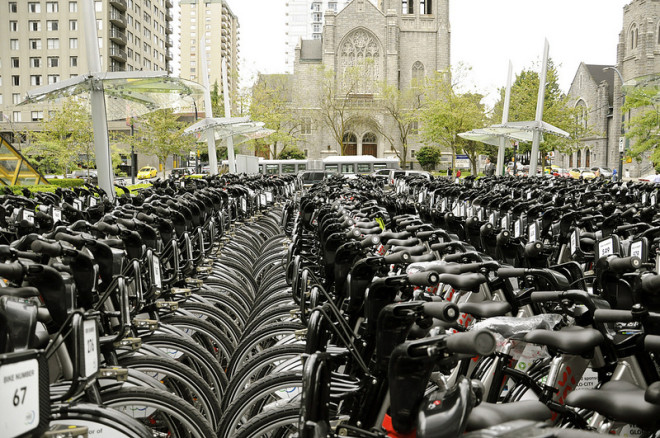
Talking about Velo-city: Another day in the press
Velo-city is up and running! Already halfway in, the conference has managed to attract hundreds of people from all around the world to discuss cycling, its impact today, and the impact that it can make in the future. With two days down, and two more to go, here’s a look at what’s been taking place in Vancouver through the eyes of the press.
Ah yes, no cycling conference is complete without a helmet debate – and this week, Vancouver’s been the site of considerable discussion on this issue.
The Province’s Frank Luba takes particular note of this topic in his article from yesterday, drawing to the forefront the relation between helmet laws and ridership.
“It is much more important to feel the freedom of cycling without a helmet” Luba quotes Hans Vernecht, economist and cycling enthusiast.
Hailing from the Netherlands, known for their highly developed cycling culture, Luba quotes Vernecht again, stating that “in the Netherlands, liability for collisions with bicycles lies with the car drivers”, and suggests that the key issue to look at is the attitude of motorists.
Changing this in Vancouver or anywhere else in North America is a difficult thing to do, though – especially in cities where adults today are not often seen pedaling to school, work or the grocery store. For this reason, Velo-city has already acted as a platform of information and resource sharing on the topic of increasing the numbers of cyclists and improving conditions for them.
Taking s another page from the Dutch, Tom Babin of the Calgary Herald writes about the much uttered phrase “lost generation of cyclists” at Velo-city. In his article from yesterday, Babin describes that this lost-generation produces worry “ that the skills of cycling on streets and in traffic have been lost over the past 30 to 40 years […]”
Solutions? Well, none that are can produce change overnight, but Velo-city has already acted a hotspot for discussion and planning for short and long-term suggestions and solutions.
One of them, as Babin mentions is to “simply start over – forget the lost adults, and teach kids to ride bikes properly.”
Presenting examples of cycling plans from the Netherlands, the UK, Australia, and many other countries, Velo-city has already created a stir regarding the ways that cycling can become part of the local fabric of cities worldwide – starting with children today.
So despite the concerns of the “lost generation” of cyclists, or helmet laws, Babin and Velo-city make one thing clear: “it’s tough to argue against the overall benefits of children’s cycling education.”
About the Author
Alexandra Cutean is the Communications Assistant at ECF and a long-time cyclist. With a background in conflict resolution and European Affairs, she spends most of her spare time looking for new places to visit, and mapping out bike routes.
Contact the author
Recent news!
Upcoming events
Contact Us
Avenue des Arts, 7-8
Postal address: Rue de la Charité, 22
1210 Brussels, Belgium











